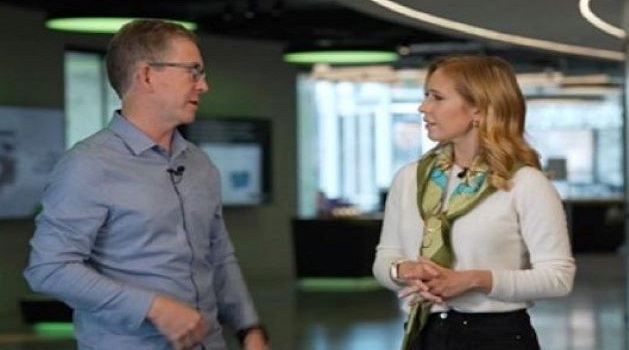Broadcasting
CNN’s Decoded Explores How the Internet of Things is Changing the Way we Live

In a new episode of Decoded, CNN’s Anna Stewart explores the smart, connected devices that make up the Internet of Things (IoT). From ordinary household items to complicated industrial systems, smart devices are changing the way we live.

Stewart visits the Expo 2020 site in Dubai to see how smart cities are using IoT to enable more informed city planning. Helmut Von Struve, CEO of Siemens Middle East gives an example, “Artificial intelligence can say within 20 minutes, 30 minutes, there would be maybe 150 people walking in this direction. So, you can already start cooling the building down.”
IoT devices are also being used to combat climate change. In Boston, a connected forest is helping scientists study how much carbon dioxide trees take out of the atmosphere.
Jackie Hatala Matthes, Senior Scientist at the Harvard Forest describes the project, “With IoT, we’re able to get really high-resolution data, high temporal resolution data, and we’re able to look at those changes in real time, which helps to feed into other global models of climate change.” One of the trees even uses IoT to tweet the data and communicate in real time what the tree is experiencing.
In Shenzhen, known as the Silicon Valley of hardware, the programme meets German entrepreneur Florian Simmendinger who has developed a modern twist on a metronome.
He explains that although it’s possible to create smart devices for many tasks now, the best ones are those that fulfil a need, “If you find something meaningful that actually improves the product experience, then you know you have a real winner on your hands when it comes to an IoT product. There’s definitely a case in the IoT space of just because you can connect something doesn’t necessarily mean you should.”
At the Jebel Ali Port in Dubai, Stewart meets Ibrahim Al Najjar, Vice President IT, at DP World who demonstrates how a network of connected sensors, devices, and software all communicate to operate the smart port.
Stewart also meets the man who created the term ‘Internet of Things’. In the late 1990s, Kevin Ashton was searching for a name for his presentation on supply chain logistics, “At that time the internet was such a big buzzword.
“I needed to shoehorn the word internet in to like get any attention at all. and here we are now. Still talking about it. That’s the biggest surprise.”
Ashton describes what makes a good IoT device, “The thing that I look for to make it the Internet of Things is it knows something about the world without a human being telling it. I don’t really think about these voice assistants people have in their kitchen where you say you know, Alexa, add this to my shopping list. Well, in my world, Alexa would know that you needed to add it to the shopping list, it wouldn’t need you to tell it.”
The idea that everything we touch, every we move we make, can be monitored and uploaded to the cloud may seem convenient and efficient, but for some it raises concerns about regulation and trust. Stewart speaks to professional hacker Ken Munro, CEO of Pen Test Partners.
He demonstrates how easy it is to hack IoT devices like a children’s doll with speech recognition and warns, “As we know, legislation often trails innovation. So I think it’s really important that we bring in some regulation to help manufacturers prioritise cybersecurity and also help protect us consumers from manufacturers who may be a bit fast and loose with security.”
The show also meets the man behind the first smart device – a Coca Cola vending machine, and visits an Amazon factory using IoT devices to be faster and more efficient.
Broadcasting
Eedris Abdulkareem Teases New Protest Anthem following NBC Ban

Eedris Abdulkareem, veteran hip hop artiste, is showing no signs of backing down as he hints at releasing another protest song, shortly after his last track was banned by the National Broadcasting Commission (NBC).

Eedris Abdulkareem, veteran hip hop artiste
He recently again stirred the political waters as he hinted at the release of a new protest song, only weeks after his controversial track Tell Your Papa was banned by the National Broadcasting Commission.
The outspoken musician took to social media on Wednesday, April 16, 2025, to share an animated cover design with the words “3 Arms of Government,” suggesting the theme of his upcoming release.
Though the title remains undisclosed, the post was captioned simply with “Stay tuned,” fueling speculation that another hard-hitting social commentary is on the way.
Abdulkareem, known for his unapologetic political views, recently described the NBC’s decision to ban Tell Your Papa as hypocritical. Undeterred by censorship, he appears set to continue using music as a platform to criticize injustice and demand accountability.
The rapper also recently reaffirmed the relevance of his classic hit Jaga Jaga, stating that it would remain the country’s “second unofficial national anthem” until key issues like security, electricity, and governance are addressed.
With another protest song on the horizon, fans and critics alike are bracing for what may be Eedris Abdulkareem’s most direct political message yet.
Broadcasting
MultiChoice Brings Easter Home with Dedicated Pop-Up Channel

In celebration of the Easter season, MultiChoice has announced the launch of a dedicated Easter Pop-Up Channel, offering DStv and GOtv subscribers across Nigeria the chance to experience live broadcasts of key Easter events and services from the Catholic Archdiocese of Lagos.

The special channel, which runs from Thursday, April 17 to Monday, April 21, will be available on DStv channel 196 and GOtv channel 28, bringing the significance and beauty of Easter directly into viewers’ homes.
Throughout the Easter period, the channel will broadcast a rich lineup of live religious events. The programming begins on Thursday, April 17, with the Chrism Mass in the morning, followed by the Mass of the Last Supper in the evening.
On Good Friday, April 18, viewers can join in the Good Friday Tenebrae and the Seven Last Words service, followed by the Stations of the Cross from St. Gregory’s, and later the Passion Service.
The spiritual journey continues on Saturday, April 19, with the Easter Vigil Mass late in the evening, leading into the Easter Sunday Mass on April 20. The channel’s special programming concludes on Monday, April 21, with the Easter Monday Mass from Galilee.
This dedicated pop-up channel is designed for those who may be unable to attend church services in person, as well as for anyone seeking to deepen their spiritual observance during the Easter holidays. By broadcasting these significant events, MultiChoice reaffirms its commitment to providing content that resonates with the cultural and religious values of its viewers.
Subscribers are encouraged to tune in to DStv channel 196 and GOtv channel 28 throughout the Easter period to take part in these important religious celebrations from the comfort of their homes.
Broadcasting
Maximise Your Easter Getaway in Nigeria with Smart Travel Hacks

Easter is almost here, and with it comes the perfect opportunity to escape the everyday hustle and embark on a memorable adventure. Whether you’re craving some ‘chilling’ time, quality ‘family’ time, or a ‘pepper dem’ getaway, Nigeria offers endless possibilities for exploration. And the best part? Travelling locally has never been easier or more affordable.

Whether you’re a ‘newbie’ traveller or a seasoned pro, we’ve got you covered with essential hacks that will make your trip a breeze. Say goodbye to stress and hello to smooth sailing as you navigate your Easter getaway like a true travel expert.
Planning your trip is like packing your suitcase – essential, not optional
Just like you wouldn’t leave home without your power-bank (just in case!), don’t head off on a quick trip without a plan. A little prep can save you time, money, and stress — from booking flights and sorting transport, to packing light and right.
Nigeria has endless ways to travel. Flying with local airlines like Air Peace or Ibom Air is quick and budget-friendly, while renting a car gives you the freedom to explore scenic routes like the drive to Erin-Ijesha Waterfalls or the journey to Obudu Cattle Ranch. Not into driving? Buses like Peace Mass or God is Good are easy and affordable. And for a truly luxurious experience, you could even consider a chartered flight – if you’re balling!
Travel like a pro: The art of smart packing
Packing smartly is a crucial travel hack that can save both time and money. Amelia Campher recently shared on TikTok how she organised her hair, beauty, makeup, and personal accessories into different vanity cases and toiletry bags from Temu. Each one perfectly stores her daily essentials, keeping everything neat and accessible. She excitedly told her followers, “This is your sign to buy these bags!” Her clever packing strategy ensures that she’s ready for any trip without unnecessary clutter or stress.
Take Jasmin’s experience, for example. After getting hit with extra carry-on fees on a previous flight, she decided to be smarter about her upcoming family trip. In her search for a solution, she found the perfect backpack on Temu for just under ₦40k. Ticking all the boxes, it avoided extra carry-on fees and allowed her to efficiently pack 16 items plus a makeup bag. When they arrived at the airport, Jasmin’s family breezed through check-in with no issues, their backpacks meeting size requirements perfectly. No extra charges, no stress; just a smooth start to their unforgettable five-day family trip.
Backpacks aren’t just ideal for air travel – they’re also perfect for road trips. Whether you’re cramming your car with family and their belongings or flying high, packing smart and light is essential. A compact, well-organised backpack can make your journey easier, no matter the mode of transport.
To avoid unexpected charges when flying within Nigeria this Easter, it’s crucial to familiarise yourself with airline baggage policies; while Economy Class typically permits 15kg to 20kg of checked luggage, and Premium Economy or Business Class allows up to 30kg, always verify specific weight limits with your chosen airline to prevent costly excess baggage fees, especially if you plan on packing more than the standard allowance.
No passport needed: Pack your bags for a Naija Detty Easter
Why travel halfway across the world when Nigeria has it all? This Easter, skip the long-haul and discover the treasures on your doorstep. From the buzzing streets of Lagos to the ancient city of Benin and the serene hills of Jos, unforgettable adventures are just a short trip away.
By travelling locally, you’re not only creating new memories — you’re also supporting local tourism and helping grow our economy. With so many destinations to explore, there’s something for every kind of traveller. So pack your bags, plan smartly, and make this Easter your best Naija Detty holiday yet.

 Telecom1 day ago
Telecom1 day agoMTN Nigeria Takes Broadband Services to the Next Level with FibreX Launch

 News1 day ago
News1 day agoSERAP Files Lawsuit Against NBC Over Ban on Eedris Abdulkareem’s Protest Song Tell Your Papa

 E-Financial1 day ago
E-Financial1 day agoFCMB Group Redefines Corporate Storytelling with The Power Of The Group TVC

 General News4 hours ago
General News4 hours agoEFCC Clarifies SCUML Certificate Misuse Amid CBEX Ponzi Scheme Scandal

 E-Financial4 hours ago
E-Financial4 hours agoCBN, NGX Group Defend Economic Reforms at Nasdaq

 Telecom4 hours ago
Telecom4 hours agoDigital Transformation Remains Africa’s Gateway to Economic Advancement – Adumike

 Telecom4 hours ago
Telecom4 hours agoPAFON 2.0: Experts Discuss Pathways to Boost Financial Inclusion in Nigeria

 E-Business4 hours ago
E-Business4 hours agoGold Hits Record High Amid U.S. Dollar Weakness and Trade Tensions

























